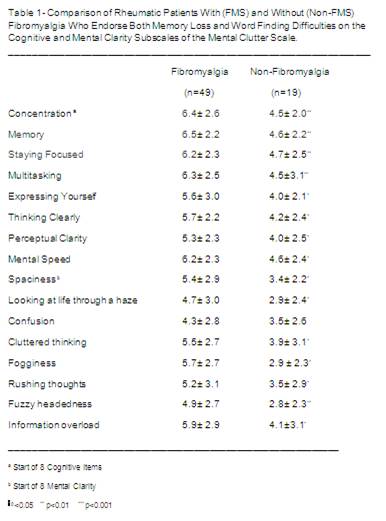Session Information
Title: Fibromyalgia, Soft Tissue Disorders, Regional and Specific Clinical Pain Syndromes: Clinical Focus
Session Type: Abstract Submissions (ACR)
Background/Purpose: A core feature of fibromyalgia (FMS) is cognitive dysfunction. The predominant clinical manifestations is memory loss; however impaired word retrieval frequently referred to as word finding difficulty sometimes unfolds in the clinical situation as the central patient focus. The purpose of this study is to build a more precise picture of cognitive dysfunction in FMS by examining the linkage between memory loss and word finding deficits and its relation to the severity of cognitive dysfunction.
Methods: Participants were 191 patients seen in a rheumatologic practice. Of these, 79 had FMS and 112 had Non-FMS rheumatic disease. Diagnosis was based on ACR criteria. The two samples were closely matched on age (FMS: 51.2 ± 12.0 vs. 51.9± 15.9); the FMS sample had slightly less education (FMS: 14.8 ± 2.1 vs. 15.5 ± 2.0). The 0.7 year mean difference was significant (p <0.05). Data on memory loss and word finding difficulty were collected by questionnaire. Data on 8 cognitive skills and 8 aspects of mental clarity were derived from the Mental Clutter Scale that was filled out by each participant.
Results: Compared to Non-FMS patients, patients with FMS were more likely to report memory loss (69.6%) [55 of 79] to (25.0%) [28 of 112] p<0.001 and word finding difficulties (69.6%) [55 of 79] to (23.2%) [26 of 112] p.<001. Within the FMS sample, 89.1% [49 of 55) of those with memory loss reported word finding difficulty, whereas 67.9% [19 of 28] of those in the Non-FMS with memory loss reported word finding difficulty (p<0.001). In respect to total samples, memory loss and word finding difficulty were coupled in 62.0% [49 of 79] of the FMS sample and in 17.0% [19 of 112] of the Non-FMS sample (p<0.001).
Results of cognitive functioning as assessed by the 16 item Mental Clutter Scale show that cognitive difficulties are substantially skewed toward patients with FMS (Table 1). Compared to Non-FMS, those with FMS endorse a higher level of disturbance on the 8 of the 8 cognitive skills, and on 7 of the 8 aspects of mental clarity.
Conclusion: Cognitive difficulty varies widely depending upon the type of rheumatic disease. Patient with FMS appear to carry a considerably higher risk for memory loss and word finding difficulties than individuals with other rheumatic disease. The memory loss-FMS relationship is well established and has played a central role in cognitive studies to date; whereas the role of word finding difficulty has been largely unappreciated.
Memory loss and word finding difficulties co-occur in FMS to an unusual degree. Cases in which these cognitive difficulties are coupled to the experience of multiple concurrent cognitive difficulties and greater mental fog as reflected by a high level of disturbance in 7 aspects of mental clarity.
At this stage, it is unclear why the cognitive picture is worse when memory loss and word finding difficulties co-occur in FMS or what mechanisms bind them together.
Disclosure:
R. S. Katz,
None;
F. Leavitt,
None.
« Back to 2014 ACR/ARHP Annual Meeting
ACR Meeting Abstracts - https://acrabstracts.org/abstract/a-strong-association-between-memory-loss-and-word-finding-difficulties-in-fibromyalgia/

